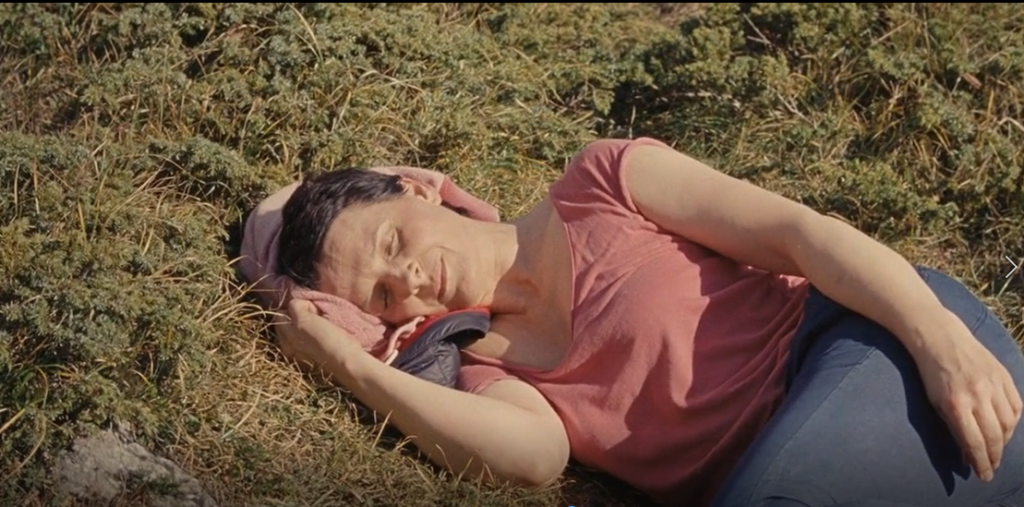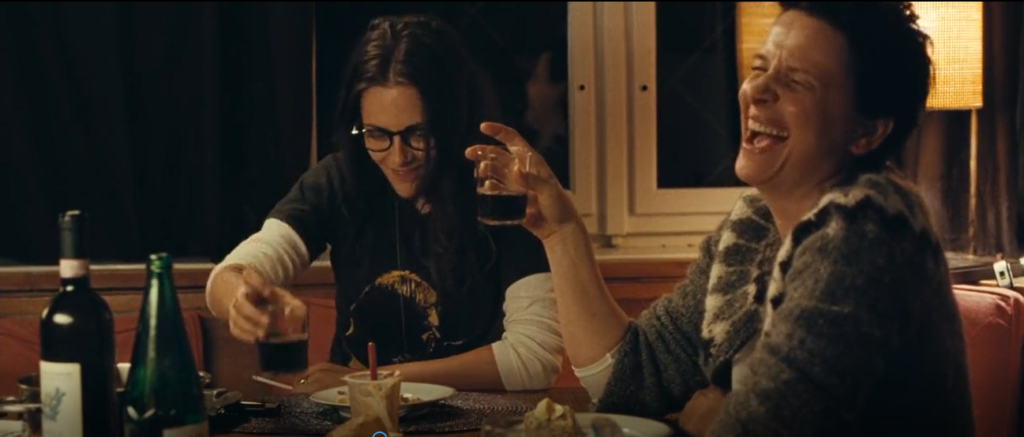In a sense, this is a deluxe lockdown film. An iconic actress Maria Enders, played by real-life French superstar Juliette Binoche, heads to the exquisite, unspoilt village of Sils Maria in the Swiss Alps to hole up in a cabin to prepare for a landmark project. With her is her young assistant Valentine, played by Kristen Stewart, who serves as sounding board and acting sandbag. They seem to have stocked up on enough food and wine and cigarettes, something I felt genuinely relieved for. The food stocks of wealthy, well-nourished people are never in doubt, yet the images of the impoverished walking home thousands of kilometres of highways has likely cut deep grooves of anxiety through my mind.
Enders is revisiting a play about two women, an older power boss who has an affair with a young woman in the office, looking for a way up. Year ago, Enders’ had played the younger woman in the film version of the play, and it had launched her career in a big way. Now, she has been offered the older woman’s part, and she accepts it grudgingly mainly on her assistant Val’s insistence. It necessitates a reflection on time past and time passing, age, mortality, legacy, for which they retire to the cottage. Every day, they read lines from the play to understand its textures, and go for long walks in Alpine meadows and skinnydip in the natural pools of water. It’s an oasis of free ‘creative’ time, possible only when you have the wealth to go on self-imposed lockdowns, or the enormous talent that fetches rarefied fellowships.

The self-references are obvious and deeply pleasurable—Binoche is the grand dame with the statuesque body of work, Stewart the young star on the rise who comes of blockbuster success but increasingly has a resume of impressive arthouse work. The screenplay too sets them up like the play within the film. The assistant Val admires her boss, when she goes on stage to make a speech, Val lets out a wolf-whistle from the wings. Her boss enjoys Val’s admiration. When Binoche and Stewart line-read the play at Sils Maria, the line between real life, and the play blur nicely. There’s also a bit where the actress slated to play the younger woman in the play is seen in blockbuster superhero film. Chloe Grace Moretz plays this actor whose star is on the rise with “trash” films, and it’s superb to watch Stewart defend the “art” of such films, having risen from a questionable blockbuster franchise like the Twilight series herself. Moreover, Binoche first came to prominence in a film called Rendezvous, the debut film of Olivier Assayas, who directs her here again, now as the grand dame of European cinema.
This is the sort of talky, chamber drama film that I used to find boring earlier. Now, I can’t have enough of it. It’s therapy without having to pay for it, and better still, having to dress and go out for it. Stewart is offering solace to younger blockbuster Stewart, Binoche lays out the dilemmas facing aging superstars, and they are both superb therapy for us watching. It’s so richly satisfying to see an older woman as charismatic as Binoche graciously accepting a younger woman’s attention. For me, it fulfilled a long-held wish to be mentored by a power woman, a desire that comes to naught for most people . Because come on, how many women can be self-absorbed like Binoche and not be annoying in real life?

This part of Alpine Switzerland is known for a weather phenomenon called the Maloja Snake, a rare cloud formation that takes on a serpent’s shape. The film foreshadows the significance of this to the story by alluding to it from the title itself. At the start of the film, we are winding around the mountains of Switzerland with Binoche and Stewart in a train—which is a modern-day snake-like form, if you think about it. Later we get breathtaking Alpine vistas and nausea-inducing hairpin bends, that snake around the mountains. We even see video footage of the cloud formation, and finally, towards the end, there is a surprise disappearance when the rare Maloja snake comes into view. Some references on the internet suggest that the Snake is supposed to be a harbinger of bad news. But it didn’t feel like that to me. The symbolism felt like a rare sighting, a flash or epiphany that clarifies and put things in perspective. Like reaching somewhere after journeying through hairpin bends and treacherous terrain, and finding who you are.
Clouds of Sils Maria (2014)
Director Olivier Assayas
Starring: Juliette Binoche, Kristen Stewart, Chloe Grace-Moretz
Streaming in India on Mubi as of July 2023